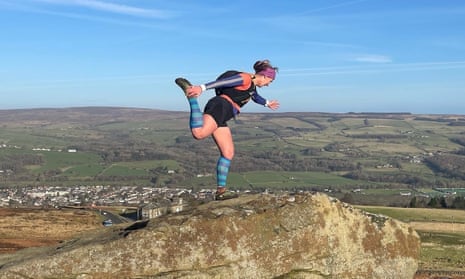One of the mysteries of Covid is how it hits the fit. Before January, I was one of those people. I ran 30 miles a week. I could turn up to a 20-mile fell race on inadequate training and run it, thoughtlessly. I did yoga, weight training and cycling. I had a low resting heart rate and strong biceps. For a 52-year-old menopausal woman, I was in extremely good shape.
But then on 3 January I fell ill with a sore throat, then flu-like weakness, a cough that hasn’t left me since, and a constant and persistent headache that is resistant to every painkiller. In the months since, I have been not ill, but not well. I have days of feeling fine, and then I don’t. As a runner, I can say that long Covid feels like the wall at mile 18 in a marathon, when suddenly your energy has gone, and you feel like a different person and you don’t know why.
It’s appropriate to use a running analogy, because it seems that runners, triathletes, cyclists and other formerly fit people populate the long Covid forums in far greater numbers than you’d expect if, like me, you assumed that fitness and health were the perfect shield. My long Covid is suspected by my GP, since I never actually tested positive, but many on the forums had only mild infections and are still suffering. Some are now in wheelchairs, or confined to bed, or disabled, or dysfunctional, and they post on social media groups that can be wonderfully precise: Long Covid for Endurance Athletes is one group I found extremely helpful (a name that caused a Crohn’s-afflicted friend to say wistfully: “Is there a group for former TV writers with a poo bag?”).
I suppose I am lucky that I have long Covid now, when science believes in it and there are long Covid clinics. The NHS Covid recovery site must be helpful for many, and it discusses PEM (post-exertional malaise) which is the delayed-onset crash after exercise and is one of the most frustrating mysteries about any post-viral condition: you exercise and feel fine, and two days later you suddenly don’t. But the NHS site and most others seem meant for people who can’t walk upstairs, not ones who wonder whether they will be able to run in heart zone 3 again, or ever do more than three miles without fearing the consequences; the ones who are not disabled but not themselves.
I turned, of course, to Google. I learned that people with chronic fatigue syndrome (CFS), or myalgic encephalomyelitis (ME), have been floored by PEM for decades and only now are they being believed. I learned that perhaps Covid is lurking in my gut, or making my mast cells fire when they shouldn’t, and that I should be careful of my heart because doing too much can give me myocarditis. But my heart is fine, along with my X-rayed lungs and my blood, once a drop in my infection-fighting white blood cells had recovered. Whatever Covid is doing to me, it is doing it quietly and sneakily.
It is stealth that characterises long Covid’s baffling array of symptoms and sufferers’ equally baffling tendency to get better, then relapse, sometimes for no reason. A Lancet study found that long Covid sufferers reported on average more than 50 symptoms during their illness, across an average of 9.1 organ systems.
Yet Covid, according to our government, is no longer a concern. Never mind that everyone I talk to about long Covid knows someone with it, that more than a million Britons have it, and almost two-thirds of those say it has significantly limited their daily activities. One in 16 people now have Covid, according to Imperial College London’s April React study, 40% more than at Omicron’s “peak” in January, and the highest number ever.
Sometimes I feel as though I am gaslighting myself. I can walk around so I can’t be ill. I can work, so I can’t be ill. Sometimes I can run, so I can’t be ill. But then I remember: once there was a time when I didn’t always have a headache. I used to be able to laugh without coughing. I used to walk to the shops half a mile away without wondering how I would find the strength to walk home again.
I am so much better off than most, the ones who have debilitating brain fog, who cannot work or walk. But still I mourn the thoughtlessness of good health, the time when, to borrow a phrase from the writer Sinéad Gleeson, my body was an afterthought. I trusted it. Now I can’t rely on my body because I don’t know what’s happening to it, and neither does anyone else. “I’m so sorry,” said my lovely GP, phoning me from her home because she had Covid. “We’re in the dark.” As are employment lawyers, still struggling to understand whether workers missing with long Covid have a disability or an occupational health condition. What is certain is that long Covid is costing us hugely, and not just in money.
Rose George has written for the Guardian, New York Times, London Review of Books and others. She is the author of several books including Nine Pints: a Journey Through the Money, Medicine, and Mysteries of Blood










